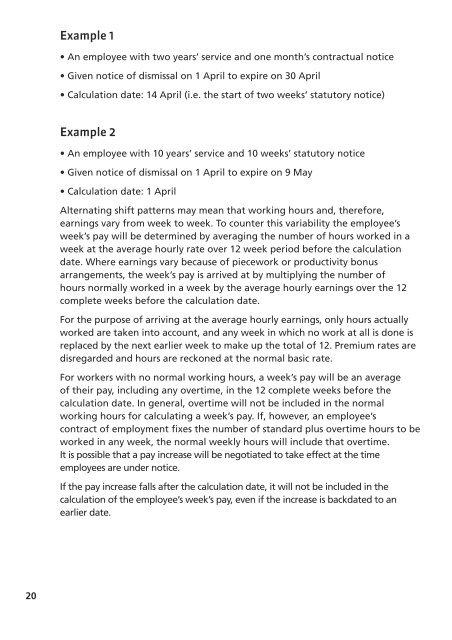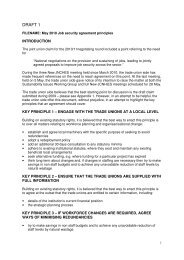Redundancy - Unite the Union
Redundancy - Unite the Union
Redundancy - Unite the Union
Create successful ePaper yourself
Turn your PDF publications into a flip-book with our unique Google optimized e-Paper software.
Example 1<br />
• An employee with two years’ service and one month’s contractual notice<br />
• Given notice of dismissal on 1 April to expire on 30 April<br />
• Calculation date: 14 April (i.e. <strong>the</strong> start of two weeks’ statutory notice)<br />
Example 2<br />
• An employee with 10 years’ service and 10 weeks’ statutory notice<br />
• Given notice of dismissal on 1 April to expire on 9 May<br />
• Calculation date: 1 April<br />
Alternating shift patterns may mean that working hours and, <strong>the</strong>refore,<br />
earnings vary from week to week. To counter this variability <strong>the</strong> employee’s<br />
week’s pay will be determined by averaging <strong>the</strong> number of hours worked in a<br />
week at <strong>the</strong> average hourly rate over 12 week period before <strong>the</strong> calculation<br />
date. Where earnings vary because of piecework or productivity bonus<br />
arrangements, <strong>the</strong> week’s pay is arrived at by multiplying <strong>the</strong> number of<br />
hours normally worked in a week by <strong>the</strong> average hourly earnings over <strong>the</strong> 12<br />
complete weeks before <strong>the</strong> calculation date.<br />
For <strong>the</strong> purpose of arriving at <strong>the</strong> average hourly earnings, only hours actually<br />
worked are taken into account, and any week in which no work at all is done is<br />
replaced by <strong>the</strong> next earlier week to make up <strong>the</strong> total of 12. Premium rates are<br />
disregarded and hours are reckoned at <strong>the</strong> normal basic rate.<br />
For workers with no normal working hours, a week’s pay will be an average<br />
of <strong>the</strong>ir pay, including any overtime, in <strong>the</strong> 12 complete weeks before <strong>the</strong><br />
calculation date. In general, overtime will not be included in <strong>the</strong> normal<br />
working hours for calculating a week’s pay. If, however, an employee’s<br />
contract of employment fixes <strong>the</strong> number of standard plus overtime hours to be<br />
worked in any week, <strong>the</strong> normal weekly hours will include that overtime.<br />
It is possible that a pay increase will be negotiated to take effect at <strong>the</strong> time<br />
employees are under notice.<br />
If <strong>the</strong> pay increase falls after <strong>the</strong> calculation date, it will not be included in <strong>the</strong><br />
calculation of <strong>the</strong> employee’s week’s pay, even if <strong>the</strong> increase is backdated to an<br />
earlier date.<br />
20

















